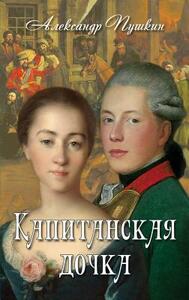Take a photo of a barcode or cover
adventurous
Alexander Pushkin's novella The Captain's Daughter is a brisk, breezy affair that reads like the 19th-century literary equivalent of a 1950s Boys' Own adventure story. The teenage protagonist—whose name I've already forgotten; it doesn't really matter, it's not that kind of book—begins his career as an army officer during the reign of Catherine the Great. He's sent to a remote posting where a rebellion threatens, and has to rescue both his honour and his commanding officer's beautiful daughter. It's an engaging and fast-paced read, albeit predictable and with a rote romance.
adventurous
emotional
reflective
tense
medium-paced
Plot or Character Driven:
A mix
Strong character development:
Yes
Loveable characters:
Complicated
Diverse cast of characters:
Yes
Flaws of characters a main focus:
No
adventurous
funny
mysterious
medium-paced
Plot or Character Driven:
A mix
Strong character development:
Yes
Loveable characters:
Yes
Diverse cast of characters:
Yes
Flaws of characters a main focus:
N/A
*Read for class.
Well, I'm surprised I liked it, because the beginning was kind of meh and Peter was annoying as fuck.
But I ended up really enjoying this, especially Pugachov's character, for some weird reason.
I wonder why Pushkin excluded one chapter, I thought I was one of the most interesting ones, but he's the author. He knows better.
Well, I'm surprised I liked it, because the beginning was kind of meh and Peter was annoying as fuck.
But I ended up really enjoying this, especially Pugachov's character, for some weird reason.
I wonder why Pushkin excluded one chapter, I thought I was one of the most interesting ones, but he's the author. He knows better.
A very nice tale. Suspense, drama, honor, compassion, romance.
emotional
tense
slow-paced
Plot or Character Driven:
Plot
Strong character development:
No
Loveable characters:
No
Diverse cast of characters:
No
Flaws of characters a main focus:
Complicated
adventurous
reflective
fast-paced
lovely! a great companion piece to the tv show The Great :D
emotional
funny
lighthearted
medium-paced
Plot or Character Driven:
Plot
Strong character development:
Complicated
Loveable characters:
Complicated
Diverse cast of characters:
Yes
Flaws of characters a main focus:
No
Un romanzo si fa leggere come una favola. Possiede tutte le caratteristiche delle filastrocche o delle favole comunemente note. La presenza di un eroe (Pëtr Andréevic Grinëv), di antagonisti (Pugaciov e Švabrin, e che antagonisti), di una damigella da salvare (Mascia Ivanovna): tutti elementi che vanno a combinarsi per rappresentare una sorta di apologo favolistico.
Puškin permette a una terribile e inaspettata ferocia di irrompere inaspettatamente nella favola, ma non rinuncia mai a una luminosa ironia: la crudeltà è sempre smorzata dal riso. Così, nonostante le violenze, le esecuzioni sommarie e gli omicidi (la povera Vasilisa Egorovna, trascinata in strada, dopo aver assistito al triste spettacolo del marito appeso alla forca, viene abbattuta da un colpo di spada sulla testa), trovandosi soli, faccia a faccia, Pëtr e Pugačëv scoppiano a ridere senza motivo. Savelic, memorabile servo del protagonista, prima di lasciare Belogorsk, presenta al sanguinario capo dei ribelli la lista dei beni sottratti dai cosacchi al suo padrone, pretendendo di essere risarcito. L'apice è rappresentato dalla lettera del padre di Pëtr a suo figlio: epica e divertente strigliata nei confronti del protagonista, "reo" di aver perso a duello e di essere fin troppo distratto dal gentil sesso.
Scritto bene e scorrevole: Puškin è ovviamente meno geniale di Dostoevskij a livello di prosa, ma è freschissimo. Paga a mio avviso - gusto personale - l'assetto "da favola" che ha condotto a un finale abbastanza anticlimatico e campato per aria, così come considero campata per aria l'estrema indulgenza - a tratti fastidiosa - di Pugaciov nei confronti di un Pëtr che è risultato intoccabile per tutto il racconto.
Puškin permette a una terribile e inaspettata ferocia di irrompere inaspettatamente nella favola, ma non rinuncia mai a una luminosa ironia: la crudeltà è sempre smorzata dal riso. Così, nonostante le violenze, le esecuzioni sommarie e gli omicidi (la povera Vasilisa Egorovna, trascinata in strada, dopo aver assistito al triste spettacolo del marito appeso alla forca, viene abbattuta da un colpo di spada sulla testa), trovandosi soli, faccia a faccia, Pëtr e Pugačëv scoppiano a ridere senza motivo. Savelic, memorabile servo del protagonista, prima di lasciare Belogorsk, presenta al sanguinario capo dei ribelli la lista dei beni sottratti dai cosacchi al suo padrone, pretendendo di essere risarcito. L'apice è rappresentato dalla lettera del padre di Pëtr a suo figlio: epica e divertente strigliata nei confronti del protagonista, "reo" di aver perso a duello e di essere fin troppo distratto dal gentil sesso.
Scritto bene e scorrevole: Puškin è ovviamente meno geniale di Dostoevskij a livello di prosa, ma è freschissimo. Paga a mio avviso - gusto personale - l'assetto "da favola" che ha condotto a un finale abbastanza anticlimatico e campato per aria, così come considero campata per aria l'estrema indulgenza - a tratti fastidiosa - di Pugaciov nei confronti di un Pëtr che è risultato intoccabile per tutto il racconto.






